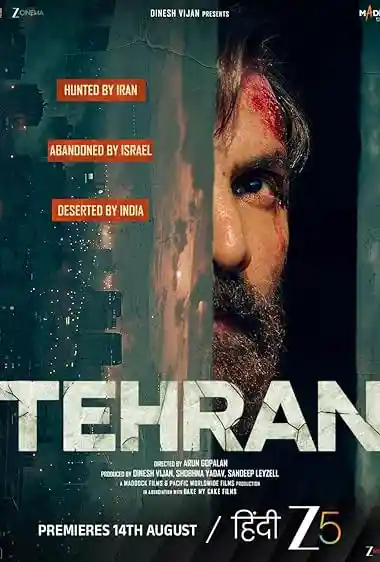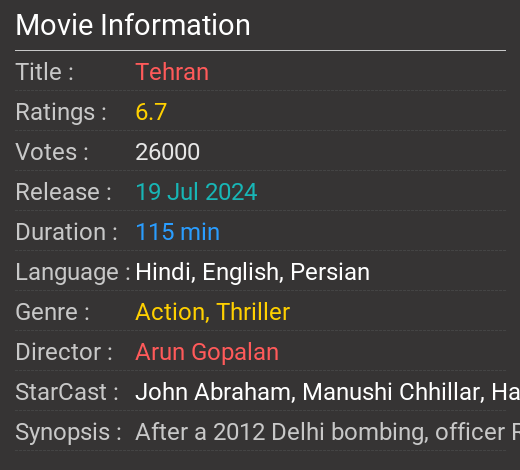Tehran (2025) Movie Review: Cast, Plot, Ratings & Full Analysis
Tehran (2025) is a Hindi-language spy action thriller directed by Arun Gopalan, marking a significant entry into Bollywood’s action genre. The film stars John Abraham as ACP Rajeev Kumar, a Special Cell officer entangled in international espionage following a deadly bombing in Delhi. Inspired by true events, Tehran offers a narrative that is intense, thought-provoking, and highly engaging. Its realistic approach and compelling storytelling make it a standout spy thriller.
Movie Overview
Tehran presents a high-stakes mission where ACP Rajeev Kumar is drawn into a covert operation after an Iranian terrorist attack near the Israeli embassy in Delhi. The tragic death of a young girl pushes him to pursue justice across borders, even when his own country distances itself from the operation. Themes of loyalty, betrayal, and personal sacrifice run deep, giving the film a layered narrative that balances action with emotional depth.
Plot Summary (Light, Non-Spoiler)
The story begins with a terrorist attack in Delhi targeting Israeli diplomats, resulting in the death of an innocent girl. Deeply affected, Rajeev Kumar embarks on a mission to identify the perpetrators. His journey spans from Delhi to Tehran, navigating political intrigue and dangerous alliances. As the story unfolds, trust is scarce, and every ally could be a potential adversary, keeping viewers engaged without revealing key plot twists.
Cast & Performances
John Abraham delivers a compelling portrayal of ACP Rajeev Kumar, capturing the character’s internal conflict and determination. Manushi Chhillar as SI Divya Rana adds nuance to the narrative, while Neeru Bajwa, Madhurima Tuli, and Elnaaz Norouzi enhance the ensemble with strong performances. The cast effectively brings authenticity to the story, making each character’s journey relatable and impactful.
Direction & Cinematography
Arun Gopalan’s direction maintains a steady pace, blending action sequences with emotional depth. Cinematographers Ievgen Gubrebko and Andre Menezes capture the essence of each location, providing realism and immersion. Strategic camera angles and dynamic framing enhance tension in high-stakes scenes, making the visuals a standout element of the film.
Themes & Style
Tehran explores themes of loyalty, betrayal, and the human cost of geopolitical conflicts. Its realistic style avoids excessive dramatization, offering a grounded portrayal of international espionage. The narrative delves into complex political dynamics while keeping the storytelling accessible, appealing to audiences who appreciate thought-provoking spy thrillers.
Strengths & Weaknesses
Strengths:
- Engaging Narrative: A compelling storyline that keeps viewers invested.
- Strong Performances: Cast delivers authentic and layered portrayals.
- Authentic Cinematography: Real-world locations enhance realism.
Weaknesses:
- Pacing Issues: Some segments may feel slow.
- Complex Plot: Intricate narrative may challenge some viewers.
Audience & Critical Reception
Tehran has been appreciated for its realistic depiction of geopolitical issues and strong performances. Critics praised the film’s grounded approach, though some noted the complexity of the plot. Fans of spy thrillers and action dramas are likely to find it engaging due to its suspenseful narrative and layered storytelling.
Ratings
| Category | Rating (/10) |
|---|---|
| Storyline | 7.5 |
| Performances | 8.0 |
| Direction & Cinematography | 7.5 |
| Visuals / Effects | 7.0 |
| Entertainment Value | 7.5 |
| Overall Rating | 7.5 |
Final Verdict
Tehran is a noteworthy addition to Bollywood’s spy thriller repertoire. Its realistic portrayal of complex geopolitical issues, combined with strong performances and an engaging narrative, make it worth watching for enthusiasts of action and espionage genres. The film balances tension, emotion, and action effectively, making it a compelling cinematic experience.
Tags: Tehran Movie Review, Tehran Cast, Tehran Box Office Collection, Tehran Review.



